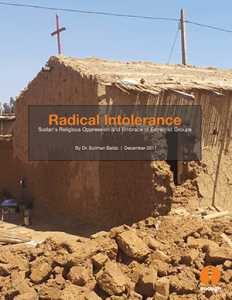 Note: This blog contains excerpts from the report “Radical Intolerance: Sudan’s Religious Oppression and Embrace of Extremist Groups.”
Note: This blog contains excerpts from the report “Radical Intolerance: Sudan’s Religious Oppression and Embrace of Extremist Groups.”
Today, the Enough Project published “Radical Intolerance: Sudan’s Religious Oppression and Embrace of Extremist Groups.” In this new report, author Dr. Suliman Baldo, Enough Project Senior Advisor, examines the Sudanese government’s persecution of Christians and many others in Sudan. The government’s ongoing abuse has included allowing extremist groups and its own security agencies to perpetrate violent attacks on Muslim Sufi groups, moderate Muslim scholars, rights defenders, and intellectuals. Dr. Baldo analyzes the Sudanese regime’s “long-standing links with active extremist religious groups within Sudan, some of which call for jihad, advocate for groups like al-Qaida or the Islamic State group, threaten Westerners and Western interests, and/or are routinely involved in committing or inciting acts of religious persecution within Sudan.”
Dr. Baldo says:
Khartoum’s track record raises critical questions about its role and true interests as a counterterrorism partner. Top U.S. policymakers who chart the next phase of engagement with Sudan should account for this as they engage in anticipated discussions about remaining sanctions, a significant shift in bilateral relations, terminating Sudan’s designation as a state sponsor of terrorism, and forgiving Sudan’s debt…”
The phase of engagement with Sudan, Dr. Baldo says, should address “core problems that continue to be central to the Sudanese regime: links to extremists and deep discrimination against religious minorities.” He notes that “little is likely to change [with the Sudanese regime] without the kinds of serious and sustained financial pressures and incentives that U.S. policymakers and their international partners can wield most effectively together.”
These pressures, he says, should focus on key officials and their networks that undermine peace and human rights, and these pressures should spare the Sudanese public,” and should include “network sanctions (i.e., asset freezes and other measures targeting a network of multiple individuals and entities together, rather than a single person, for greater effectiveness).” Such sanctions should be “combined with anti-money laundering measures, such as advisories issued by international financial intelligence units to encourage financial institutions to engage in heightened monitoring and alert potential money laundering activities or other risky activities, particularly by Sudanese politically exposed persons (PEPs) who may otherwise use the U.S. and international financial systems to move or obscure the proceeds of corruption.”
Dr. Baldo says:
Incentives for the Sudanese government, such as removal of the state sponsor of terrorism designation and support for Sudan’s debt relief, should be tied to the implementation of fundamental reforms” in Sudan.
Read Dr. Baldo’s full report here.

